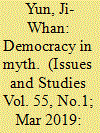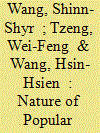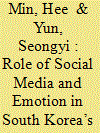|
|
|
Sort Order |
|
|
|
Items / Page
|
|
|
|
|
|
|
| Srl | Item |
| 1 |
ID:
164804


|
|
|
|
|
| Summary/Abstract |
After undergoing a series of mass demonstrations during the past three decades, including the 2016–2017 candlelight protests that led to the impeachment of President Park Geun-hye, many commentators in South Korea are confident that their country has become a land for what Karl Marx called “free men.” Korean citizens are portrayed as being ready to participate in voluntary political associations and collective actions and to pursue their interests in the public sphere. However, the data are showing the opposite to be true: citizen participation in public-sphere activities has substantially decreased since the mid-2000s, while the government has managed to improve or at least maintain its political responsiveness during the same period. Explaining the unnoticed background to this imbalance, this essay sheds light on the myth of the benefactor state in Korean democracy, arguing that this has emerged because neoliberalism has not only placed an increasing number of people in precarious positions but also neutralized them politically. The Korean government has capitalized on this situation to mythicize itself as a benefactor state that possesses an incomparable administrative capacity to take care of precarious people. By investigating the period of Park’s presidency (2013–2017) and the current rule of President Moon Jae-in (2017–), this essay shows how the myth of the benefactor state has emerged and created a unique cycle of Korean democracy.
|
|
|
|
|
|
|
|
|
|
|
|
|
|
|
|
| 2 |
ID:
164807


|
|
|
|
|
| Summary/Abstract |
While China’s economic reforms have produced undeniably positive outcomes, a rapid increase in popular protests has become most striking in recent years. As protests grow steadily in both scale and frequency, the government continues to tout social stability as the chief concern of China today. These mounting tensions reflect a direct clash of horns between the maintenance of stability and the public’s desire to exercise their rights, frequently culminating in acts of repression by the Chinese state in order to quell the unrest. This raises an important question: how can the relationship between repression and popular protest in China be characterized? More specifically, which precise circumstances of popular protest elicit the employment of China’s repressive state capacity? Taking into account both theoretical perspectives and empirical analysis, this paper attempts to elucidate the issue by first collating a large body of data to clarify the precise characteristics of popular protest, then undertaking quantitative analysis to identify which factors trigger the mobilization of China’s machinery of repression. Furthermore, this study identifies that in recent years, the use of state repression has risen in parallel with an increasing emphasis on the principle of “maintaining social stability” in China.
|
|
|
|
|
|
|
|
|
|
|
|
|
|
|
|
| 3 |
ID:
164806


|
|
|
|
|
| Summary/Abstract |
In the past few decades, post-democratization politics in South Korea have witnessed an upsurge in authoritarian nostalgia, called the “Park Jung-hee syndrome.” This paper examines the origins of public nostalgia for the authoritarian dictator by putting two theoretical arguments, i.e., the socialization thesis and the system output thesis, to an empirical test. This paper utilizes the 2010 Korea Democracy Barometer from the Korea Barometer and the 2010 and the 2015 Korean National Identity Survey from the East Asia Institute. The empirical analysis of the South Korean case strongly supports the political socialization argument, suggesting that citizens’ yearning for Park Jung-hee is not merely an outcome of the negative evaluations of the democratic governments’ performances. Rather, their authoritarian nostalgia is in large part an outcome of their political socialization during the Park dictatorship. The analysis implies that, although a resurgence of the Park Jung-hee syndrome in post-democratization South Korea is not expected to derail the country’s route to democratic deepening, it may continue to be a main source of political division in partisan and electoral politics in the future.
|
|
|
|
|
|
|
|
|
|
|
|
|
|
|
|
| 4 |
ID:
164805


|
|
|
|
|
| Summary/Abstract |
Previous studies have shown that social media is effective in large-scale mobilization, facilitating leaderless and more flexible forms of resistance. However, some scholars argue that this type of mobilization suffers from a lack of organizational form and collective identity. This paper shows that social media-centered networks can in fact promote collective actions powerful enough to challenge a corrupt president. We also prove the role of emotions in collective actions. Using an empirical analysis of the 2016 Presidential Impeachment Protests surrounding “Choi Soon-sil Gate,” we first demonstrate the effects of social media activities on participation in collective actions. Next, we explore the effects of anger on social media activities and participation. In short, this study reveals a new angle on social media’s influence in mobilizing collective actions by analyzing the effect of emotions on participation. In this process, social media activities are escalated by emotional outbreaks, and participation then increases throughout a given collective action.
|
|
|
|
|
|
|
|
|
|
|
|
|
|
|
|
|
|
|
|
|